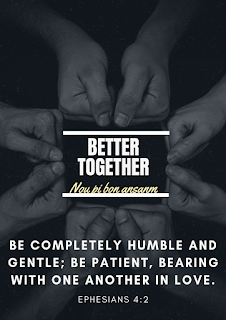It is peculiar to look back on my life at the beginning of
2018 and note how much has changed. I’ve never been much for New Year resolutions
or extensive reflection on the year. I tend to hold the belief that a fresh
start can happen anytime, and the date on a calendar doesn’t really make a big difference
in the grand scheme of life. However, this year I have found myself to be
surprisingly grateful for the timestamp that will mark the end of this season. It
is as if God has indicated to me that the difficult season I have been in is
coming to a halt. Certainly, challenges may very well be present in the coming
season. However, there is a hope and burst of energy He has placed inside of me
for 2019 that wasn’t there before. I am expectant and excited for what is in store.
I am ready for what may come, good or bad. I am mentally in a place that I’ve
never really been in before…one of which I just know that God will take care of
me, teach me, and protect me regardless of what happens.
As most readers probably know, 2018 was a year of many life
changes for me. I quit my job, packed up my life in two suitcases, and
committed to living in Haiti for a year. This decision was initially really
exciting and adventurous, but quickly brought on many challenges that I never
really expected. I faced loneliness greater than I had ever experienced, encountered
daily struggles of living in a different culture, and found myself in the
middle of conflicts I never would have chosen to be involved in. In many
circumstances, I felt myself feeling completely stripped of my comforts and
crutches. In the peak of frustration, stress, and adjustment, my weaknesses
became clearer to me than ever before.
I don’t share any of these emotions with the intent of
blaming someone or being pitied. Honestly, I believe deep within my spirit that
this “emotional stripping,” if you will, was exactly what God had planned for
me in 2018. As much as it stinks to be in a season of brokenness, there is something
special about it that breeds a higher level of trust and growth. Being in a state of vulnerability
facilitates dependence on a Savior.
As the end of 2018 is approaching, I am grateful for what
God has revealed to me this year. I have learned the lesson of what it is like
to function without full surrender and total abandon to a Savior. I am humbled
to have endured some great challenges that have taught me dependence. I am
joyful for the growth and trust that has been established as a result of
seeking God on a level I had never reached before.
Lastly, I am super excited for what God has planned in 2019.
As I continue to shift the reins of control over to God, I can only imagine
the blessings and powerful things He will do.
For those in a season of brokenness or “emotional stripping,”
I encourage you to take this New Year as an indicator of God giving you a fresh
start. Instead of looking on the past year with sadness or bitterness, declare triumph
in the lessons learned. Thank God for His goodness in spite of struggle. Be
reminded of our need for a Savior, and trust that His plans are GOOD. It is my
prayer that you are blessed in the year of 2019, and that hope is restored
within your spirit!
Until next time,
Tamara








